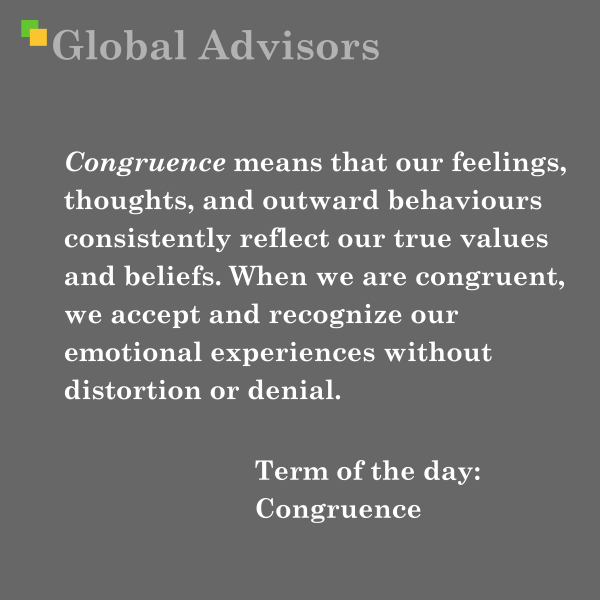Congruence, as defined by Carl Rogers, is a state of alignment or harmony between an individual’s self-concept (their real self) and their ideal self (who they wish to be). Rogers developed this term within his humanistic approach to psychology in the 1950s, making it a central tenet of person-centered therapy.
Congruence means that our feelings, thoughts, and outward behaviours consistently reflect our true values and beliefs. When we are congruent, we accept and recognize our emotional experiences without distortion or denial. This internal unity leads to authenticity and a sense of well-being, as our actions and communications transparently match our internal state.
- If the self-concept and real experiences are in sync, a person is congruent.
- If there is a mismatch—a person pretends or hides their true feelings—this is incongruence.
Rogers was clear that perfect congruence is rare; most people fluctuate between states of congruence and incongruence. Striving towards greater congruence, however, supports mental health, self-esteem, resilience, and deeper relationships. Rogers emphasized that congruence is enabled by experiences of unconditional positive regard: being valued by others without conditions leads people to accept themselves and, over time, align their ideal and real selves.
“We cannot change, we cannot move away from what we are, until we thoroughly accept what we are. Then change seems to come about almost unnoticed.”—Carl Rogers
Related Strategy Theorist: Abraham Maslow
Backstory and Theoretical Relationship
Abraham Maslow is the most significant related theorist when it comes to congruence, particularly through his concept of self-actualization. Maslow, like Rogers, was a founder of humanistic psychology. Self-actualization refers to the fulfilment of one’s unique potential and the desire to become everything one is capable of becoming. Maslow placed this at the pinnacle of his Hierarchy of Needs, suggesting that after basic physiological and psychological needs are met, individuals are driven to realize their true selves—a state highly congruent with Rogers’ congruence.
Maslow’s work on authenticity, growth, and inner motivation provided a broader societal and organizational context for Rogers’ ideas. While Rogers delved into therapy and the individual’s emotional life, Maslow examined what congruent living looks like in leadership, creativity, and strategic action. His studies of exemplary individuals (like Abraham Lincoln and Eleanor Roosevelt) showcased that the most successful people are deeply congruent: they live by deeply held principles, are comfortable with themselves, and integrate their personal and professional actions around their genuine values.
Biography:
Abraham Maslow (1908–1970), American psychologist and professor, began his career studying motivation and personality. Dissatisfied with the era’s focus on pathology, he championed human potential, peak experiences, and holistic well-being. Maslow’s legacy continues through modern organizational development, leadership theory, and coaching—domains where alignment between belief, strategy, and action (congruence) is recognized as the hallmark of effective leadership.
In summary, both Rogers and Maslow emphasized that living congruently—not just knowing our values but embodying them in action—is essential for authentic growth, psychological health, and strategic clarity.


